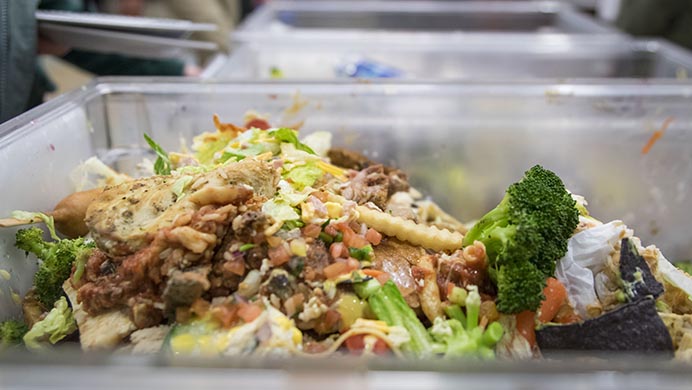Opinion | UI needs to do a better job addressing food waste
There are many things the University of Iowa can do to help advocate for less food waste by students in the dining halls.
Compostable food waste is tracked in plastic bins at Hillcrest Dining Hall on Wednesday, March 8, 2017. The food is being weighed as part of a food waste audit to measure students’ trash.
November 8, 2021
If you’re like most University of Iowa students, you’ve lived in the dorms and had the pleasure of eating at one of three university dining halls. While this is a prime time to destress, relax, and laugh with friends, the dining halls also reflect a serious social issue: food waste in in the U.S.
According to a 2018 US Department of Agriculture study, an average of one pound of food per person is wasted in the U.S. each day.This is equivalent to a little over a palm-sized portion of food, which totals to an average of about 73.5 oz a week per student. This is an appalling amount of food going to waste, and it is unfortunately not an issue that is not talked about nearly enough.
The university should be more proactive and transmit a stronger anti-food waste message to students.
From what I have seen, there are only a few signs informing students about food waste and what they can do to prevent it in the dining halls.
Having more prominent and visible signs or posters can make a big difference in how much food students take as they become more conscious about how much they will actually eat and how much will end up wasted.
In one study, signs expressing environmental concerns for water usage hung in one room and another room had no signs. After 51 participants used the sink in both rooms, the room with the signs used significantly less water than the room with no signs. A constant visual reminder is instrumental in changing individual habits.
It must be made clear that these messages are not to stop students from eating a certain amount, but instead discourage students from taking more than they will consume.
Students should also be made aware that, in the long run, less food waste will lead to lower costs for dining halls because the dining halls will have to produce less food.
While this is a powerful incentive, it’s less relevant for students who may only eat in the dining halls for one or two years, and would be unaffected by price changes to the meal plan in the future. However, this is still an impactful way we can appeal to the current meal plan-users to be more mindful of what food they take.
Another powerful strategy the UI should try is providing places, such as bins or trays, where unopened and unused food products can go at the end of the meals. Extra foods can be donated to food pantries, which are always looking for fully packaged food.
Olivia Ruby, a former employee of the UI Burge Dining Hall, experienced this issue first-hand.
“I would see a lot of people throw away perfectly good food that hadn’t even been opened,” Ruby said. “It felt like such a waste of food but there was nowhere else that they could put it and if they don’t have a fridge in their dorm, they have no way to store it.”
Overall, there are many simple, yet effective, methods that the UI could deploy to dramatically change the waste that students are currently producing in the dining hall. It’s time for the UI to put these methods to use.
Columns reflect the opinions of the authors and are not necessarily those of the Editorial Board, The Daily Iowan, or other organizations in which the author may be involved.



